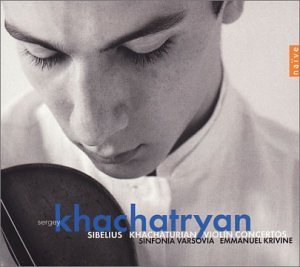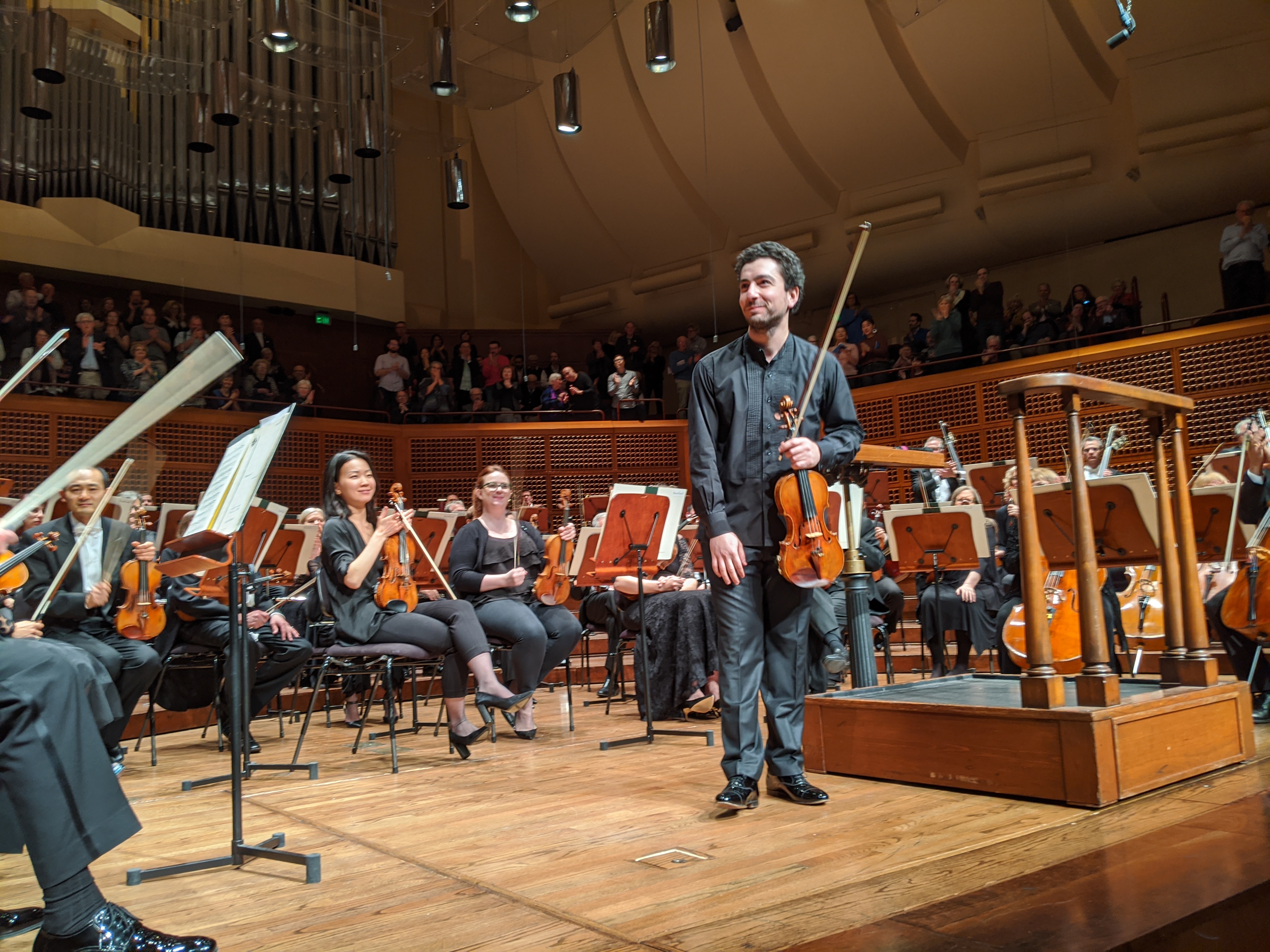Sergey Khachatryan Plays From the Heart
January 24 2020Tonight was a vivid reminder of why it’s so important to attend concerts live in person. We were completely and joyously surprised by the heartfelt playing style of Sergey Khachatryan. In his hands, Sibelius was the same notes and yet entirely different, a lot more personal and introspective.
The program started with Jörg Widmann newish piece (from 2008), Con Brio, a celebration of Beethoven’s music. Khachatryan was next with the Sibelius Violin Concerto. And then the San Francisco Symphony closed out the concert with Beethoven’s Symphony No. 7, as part of the Beethoven 250 series. Dima Slobodeniouk was the conductor. We had seats in the first row, so as to get a better experience watching Khachatryan.
The Widmann piece was chaotic and very random. There were several overt allusions to Beethoven’s symphonies, (the piece starts on the same A major chord that Beethoven’s 7th starts on). Overall, it was interesting, but perhaps a bit too abstract for my taste.
Khachatryan is the reason we bought tickets to this concert in the first place. I have been passively following his career ever since I heard his debut album, which included the Sibelius and Khachaturian violin concertos. I mostly focused on his playing of the Khachaturian, and I remember thinking it was an interpretation that made a lot of sense, having accentuated the melodical and lyrical passages of the piece. Unfortunately, Khachatryan doesn’t tour the US very often, so I’ve always wanted to try to hear him live in person if possible.

The beginning of Sibelius is ethereal and otherworldly in the hands of any good professional concert violinist. But when Khachatryan first started the lyrical opening, I found I couldn’t breathe. His playing seemed completely effortless. The vibrato jumped off the string. Khachatryan’s vibrato is lively and wide. It is neither a finger or wrist vibrato, it is an entire hand vibrato. He was completely in control. Partway through the first movement, I suddenly realized that Khachatryan was playing much slower than the typical convention, but it was nearly unnoticeable because I was just transfixed by his playing. Similarly, the cadenza to the first movement was another place I found myself daring not to breathe, afraid to disturb his playing.
There were moments of pure surprise and exhiliration. The end of the first movement famously has the violin soloist play a fingered harmonic as the penultimate note. Khachatryan eschewed it entirely and instead played the fingered note high up on the E string with such volume, intensity, and vibrato, that now I cannot envision any other way to play that ending.
It’s worth bringing up Khachatryan’s vibrato more specifically. As I already mentioned, it is really an entire hand vibrato, so it is both wide and quick. But the best feature is his vibrato rate - almost every note gets vibrated, and Khachatryan doesn’t play games with not starting the vibrato right away for long notes. It is really just a constant stream of singing, and it is incredibly effective.
Because of the full hand vibrato, I feel confident in pronouncing Khachatryan does something better than any violinist I have ever seen in person, which is fourth finger vibrato. Many great violinists never develop a strong fourth finger vibrato - it’s the weakest finger and most passages can be re-fingered to avoid it on key notes. But with Khachatryan, the fourth finger is just as strong and singing as the rest.
Khachatryan also has very good bow control and body movements. He moves a lot and also has quite a few facial expressions. But unlike some other soloists, I really didn’t feel like the movement was for show, but instead was simply because they couldn’t be contained. All the movements go back to the effortless playing. It didn’t register for me that Khachatryan was trying very hard until the last movement.
The second movement accentuated all the previous strengths of Khachatryan. He is a real singer on the violin.
The last movement is the showpiece, with large chords, harmonics galore, and running thirds. Here, some of Khachatryan’s weaknesses were more apparent. I haven’t talked much about his hard technical skills. Khachatryan quite frequently had intonation problems. He also didn’t always play well with the orchestra, often taking extremely different tempos from the established orchestral tempo. He also struggled quite a bit with the bow technique in the running thirds (his bow hand wasn’t clean, and it made the run sound muffled).
But this is all competely secondary. The bottom line is Khachatryan brought completely new life to a piece that I’ve heard hundreds of times. He opened my eyes on what consistent vibrato can bring to playing. He seemingly played completely from the heart, with no false modesty. There are plenty of worldclass violinists that can play Sibelius without missing a note. I remember thinking during the performance that even with some of the intonation and technical struggles, if I had the abiliity to play the Sibelius however I chose, I would choose to play like Khachatryan.
The crowd was with Khachtryan the whole way. There was audible excitement at the conclusion of the first movement. And Khachatryan got a slam dunk standing ovation at the end of the piece.

For the encore, Khachatryan again chose something completely personal, a tenth century Armenian piece called Havoun Havoun by Grigor Narekatsi. It was simple and lovely. It’s not surprising that Khachatryan would choose to play a song that accentuates simple singing and melodic lines. They are the foundation from which Khachatryan excels.
The rest of the concert was a somewhat auto-pilot version of Beethoven 7 from the SFS. I should be clear that even an auto-pilot rendition is still exhilirating to watch, if not just to revel in the mastery of Beethoven. The 7th is an absolute masterpiece. But unlike with Khachatryan, it was pretty clear that the SFS musicians didn’t exactly have their hearts in the music. Lots of missed bowings (particularly in the last movement, which is always tricky for bowings). And throughout the piece, the orchestra’s dynamic range basically went from mezzo forte to about forte (I concede that this might be because we were in the front row, so the sound wasn’t as well balanced). In general, I can’t really blame the musicians for the lack of focus. They will be playing a lot of Beethoven in the coming months.
comments powered by Disqus